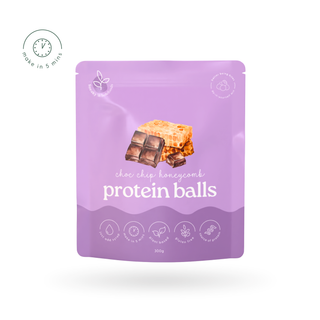Sugar alcohols might sound like a dream ingredient for healthy snacks – they’re low-calorie, low-sugar, and often used in protein bars and "sugar-free" snacks. But here at Sneaky Wholefoods, we believe there’s more to the story. While many health foods lean on these sugar substitutes to sweeten up their products, we’re taking a different approach – and it’s all about making you feel good from the inside out.

So what are sugar alcohols and why do so many brands rely on them?
Sugar alcohols are a type of carbohydrate derived from fruits and vegetables, although most commercial sugar alcohols are synthetically or artificially produced.
Unlike traditional sugars (sucrose, glucose, and fructose), sugar alcohols are only partially absorbed by the body, resulting in fewer calories (about 25-75% fewer calories per gram than sugar) and a lower impact on blood sugar levels.
Why are sugar alcohols in most protein bars?
The lower calorie content of sugar alcohols makes them appealing for those wanting to cut back on the sugar or calories they’re consuming, and this is why they’re often a staple ingredient in ‘health food’ options, particularly those marketed as "sugar-free," “low-carb” or “high protein”.
Indeed, turn over any protein bar in your local supermarket and you’re bound to spot at least one sugar alcohol on ingredient list - hint: look for anything containing an "-ol" at the end of the name! Common examples include sorbitol, erythritol, xylitol, mannitol, erythritol, and maltitol.

What’s the catch?!
While sugar alcohols might seem like the ideal solution to allow consumers and food brands to have their metaphorical cake and eat it too, there’s a catch. The main downside to sugar alcohols is this: when taken in high amounts they can cause gastrointestinal (GI) problems, such as bloating, abdominal pain, diarrhoea, or loose stools. In fact, you may have also noticed the warning that comes on some of these packages - “excess consumption may have a laxative effect”. This warning is not without merit!
Because sugar alcohols are slowly digested, they have more time to feed bacteria in the gut, which can lead to fermentation and the production of excess gas. Their slow digestion also can pull extra water into the colon, causing loose, runny stools (this is the laxative effect!)
Imagine fueling your workout with a protein bar, only to have your stomach feeling like a balloon, cramping or needing to rush to the loo mid-training session. Not exactly ideal. If you’ve ever experienced that post-protein bar rumble and gurgle stomach, a sugar alcohol is likely the culprit.
While sugar alcohols can replicate the sweetness of sugar without the added calories, they do also often have a slightly different (and distinct) taste and texture. This can affect the overall sensory experience of the foods containing them - we’re guessing you’re probably familiar with that lingering aftertaste we’re talking about. It can be metallic, tingly or chalky, and can make even the most initially delicious protein bar become pretty unappetising with each bite taken.
Why we believe natural sweetness is the way to go:
We’re not in the business to make you feel uncomfortable, sick or to offer you a snack without any real flavour or satiation - which is why we choose to use natural sugars over any type of sugar alcohol or artificial sweetener. While the natural sugars we use may add some calories to your protein bar, they deliver benefits that sugar alcohols can’t compete with! For example, the natural sweeteners in our protein bars offer depth of flavour, pack in extra whole food nutrients like fibre and antioxidants, and provide a steady source of energy that will sustain you for longer. You’ll be able to maintain your physical and mental performance without tapping out or crashing later, and most importantly - without experiencing digestive distress!
We believe that snacking should serve a purpose and that your body deserves the good stuff — no warning labels required.
Explore more about our the ingredients we choose to use in our snacks here
~ Steph McDonald - Nutritionist







